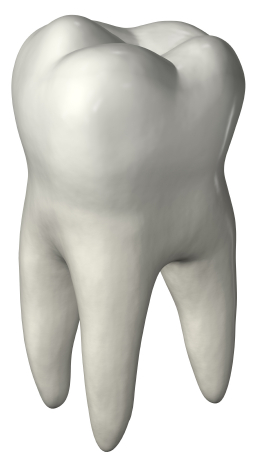Why do we have wisdom teeth?
 Sun, July 1, 2007 at 1:24 AM
Sun, July 1, 2007 at 1:24 AM  Tucked away at the back of your mouth are the the heavy mashers of the enamel world.
Tucked away at the back of your mouth are the the heavy mashers of the enamel world.
Anthropologists believe that your third set of molars (wisdom teeth), are the evolutionary answer to your ancestor’s early diet of coarse, rough food – like leaves, roots, and the occasional wiry squirrel – which required some major chewing power and resulted those little front teeth being worn down to useless nubbins in no time.
Your current diet with its softer foods and yogurt products (something your distant ancestors would have loved), along with marvels of modern technologies such as forks, knives, and Tom LeLanes new super-quite Juicer have relegated wisdom teeth to the status of just another lowly dental scare tactic. As a result, evolutionary biologists now classify wisdom teeth as vestigial organs, or body parts that have become functionless due to evolution. You know, like your coccyx.
From baby teeth to permanent teeth, tooth development lasts years. While your first molar erupts around the age of six and the second molar pokes it’s head above gum at around the age of 12, wisdom teeth, which begin forming around your tenth birthday usually don’t erupt until you are between the ages of 17 and 25. Because this is the age that you stop putting your body parts inside pencil sharpeners and pulling the ear hair out of feral dogs, the set of third molars has been nicknamed “wisdom teeth.”
Some people never get wisdom teeth, leading to the term ‘non-wisdom teeth people’, but for those who do, they may sprout anywhere from one to four – and, on very rare occasions, more than four. If you’re one of the unfortunates who get these extraneous, or supernumerary, teeth, it can lead to all sorts of problems.
Since human jaws are smaller than they used to be (possibly due to fashion), when wisdom teeth form they often become impacted, or suppressed, by the other teeth around them. (Evidently teeth are imperialist capitalists whose only wish is to subjugate their immediate neighbors.) If the tooth only partially erupts, food gets trapped in the gum tissue surrounding it which creates a perfect little home for bacteria leading to the potential for a serious infection and really bad breath. (Some people have bad breath without this.)
American Association of Oral and Maxillofacial Surgeons estimates that about 85 percent of wisdom teeth will eventually need to be removed. This dovetails nicely with the fact that Oral and Maxillofacial Surgeons are the ones who remove them.
The association recommends that patients remove wisdom teeth around 15 to 18 in order to “prevent future problems and to ensure optimal healing” and because no one cares if teenagers can’t talk for a week.
 11 Comments | | posted in
11 Comments | | posted in  Science
Science 

Reader Comments (11)
i am 13 and i am already
getting wisdom teeth
What about the theory that these teeth are missing as the cranial vault has increased in size via evolution, etc. This is compared to our ancestors (other primates). Some indian tribes, I believe, even have 4th molars.
Second most oft missing teeth are upper lat incisors (also less needed for chewing).
Removing the wisdom tooth before or after it cause trouble was an issue before. Dental specialists were arguing whether to pull it off before it hurts or just leave it until it already makes you uncomfortable. Sometimes even older people have still their wisdom tooth so why bother to pull it when they can live with it.
Thanks for the article, I was just wondering why God created us with a wisdom tooth, after doing some research I realized the problem was actually us turning away from the old fashioned raw foods to luxury way of preparing food which caused our jaws to become more sensitive and spoiled to certain foods resulting in a mess.
somebody with a few genuine thoughts on this subject matter. Really.. thanks for starting this up. This website is
something that’s needed on the internet, someone with a little originality!